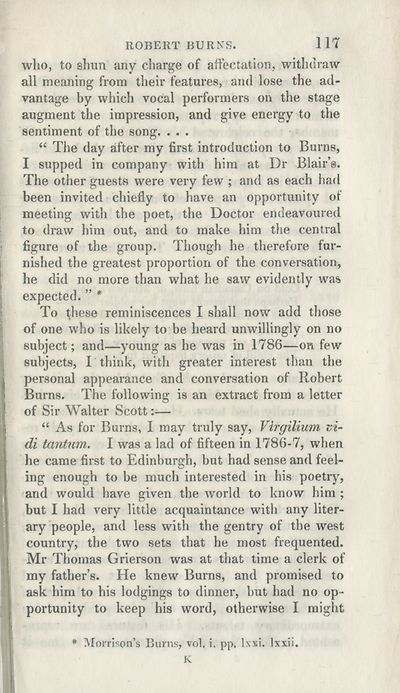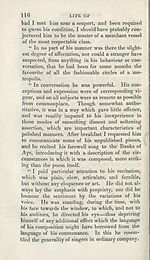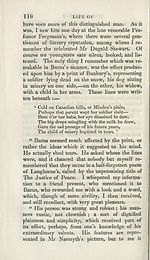Scotland/Scots > Life of Robert Burns
(127)
Download files
Complete book:
Individual page:
Thumbnail gallery: Grid view | List view

ROBEKT BURNS. 1 IT
who, to shun any charge of affectation, withdraw
all meaning from their features, and lose the ad¬
vantage by which vocal performers on the stage
augment the impression, and give energy to the
sentiment of the song. . . .
“ The day after my first introduction to Burns,
I supped in company with him at Ur Blair’s.
The other guests were very few ; and as each had
been invited chiefly to have an opportunity of
meeting with the poet, the Doctor endeavoured
to draw him out, and to make him the central
figure of the group. Though he therefore fur¬
nished the greatest proportion of the conversation,
he did no more than what he saw evidently was
expected. ” *
To these reminiscences I shall now add those
of one who is likely to be heard unwillingly on no
subject; and—young as he was in 1786—on few
subjects, I think, with greater interest than the
personal appearance and conversation of Robert
Burns. The following is an extract from a letter
of Sir Walter Scott:—
“ As for Burns, I may truly say, Virgilium vi-
di tantum. I was a lad of fifteen in 1786-7, when
he came first to Edinburgh, but had sense and feel¬
ing enough to be much interested in his poetry,
and would have given the world to know him ;
but I had very little acquaintance with any liter¬
ary people, and less with the gentry of the west
country, the two sets that he most frequented.
Mr Thomas Grierson was at that time a clerk of
my father’s. He knew Burns, and promised to
ask him to his lodgings to dinner, but had no op¬
portunity to keep his word, otherwise I might
* Morrison's Burns, vol. i. pp, Ixxi. Ixxii.
K
who, to shun any charge of affectation, withdraw
all meaning from their features, and lose the ad¬
vantage by which vocal performers on the stage
augment the impression, and give energy to the
sentiment of the song. . . .
“ The day after my first introduction to Burns,
I supped in company with him at Ur Blair’s.
The other guests were very few ; and as each had
been invited chiefly to have an opportunity of
meeting with the poet, the Doctor endeavoured
to draw him out, and to make him the central
figure of the group. Though he therefore fur¬
nished the greatest proportion of the conversation,
he did no more than what he saw evidently was
expected. ” *
To these reminiscences I shall now add those
of one who is likely to be heard unwillingly on no
subject; and—young as he was in 1786—on few
subjects, I think, with greater interest than the
personal appearance and conversation of Robert
Burns. The following is an extract from a letter
of Sir Walter Scott:—
“ As for Burns, I may truly say, Virgilium vi-
di tantum. I was a lad of fifteen in 1786-7, when
he came first to Edinburgh, but had sense and feel¬
ing enough to be much interested in his poetry,
and would have given the world to know him ;
but I had very little acquaintance with any liter¬
ary people, and less with the gentry of the west
country, the two sets that he most frequented.
Mr Thomas Grierson was at that time a clerk of
my father’s. He knew Burns, and promised to
ask him to his lodgings to dinner, but had no op¬
portunity to keep his word, otherwise I might
* Morrison's Burns, vol. i. pp, Ixxi. Ixxii.
K
Set display mode to:
![]() Universal Viewer |
Universal Viewer | ![]() Mirador |
Large image | Transcription
Mirador |
Large image | Transcription
| Antiquarian books of Scotland > Scotland/Scots > Life of Robert Burns > (127) |
|---|
| Permanent URL | https://digital.nls.uk/108247383 |
|---|
| Description | Thousands of printed books from the Antiquarian Books of Scotland collection which dates from 1641 to the 1980s. The collection consists of 14,800 books which were published in Scotland or have a Scottish connection, e.g. through the author, printer or owner. Subjects covered include sport, education, diseases, adventure, occupations, Jacobites, politics and religion. Among the 29 languages represented are English, Gaelic, Italian, French, Russian and Swedish. |
|---|

